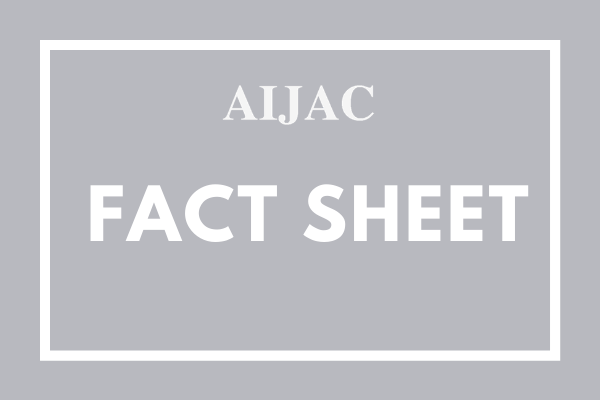FACT SHEETS
Boycott, Divestment and Sanctions against Israel (BDS)
April 5, 2020 | AIJAC staff

This fact sheet is current as at April 2020.
SUMMARY
The Boycott, Divestment and Sanctions (BDS) campaign against Israel has become a key tactic to delegitimise and isolate Israel internationally.
While many BDS supporters claim it is a non-violent human rights movement that seeks to persuade Israel to withdraw to its pre-1967 borders, the leadership of the BDS movement has stated its intention is to destroy the Jewish State of Israel.
THE FACTS
Key problems with the BDS campaign
1. BDS rejects Israel’s right to exist
Omar Barghouti, the co-founder and leader of the BDS movement has stated, “Definitely, most definitely we oppose a Jewish state in any part of Palestine. No Palestinian, rational Palestinian, not a sell-out Palestinian, will ever accept a Jewish state in Palestine.”
The BDS movement advocates for Palestinian refugees and their descendants to have a “right of return” to Israel. This would end Israel’s existence as a democratic Jewish state, as millions of Palestinians would create a Palestinian majority.
The BDS movement also opposes the two-state solution by rejecting the right of the Jewish people to have self-determination in any part of Israel. For example, BDS co-founder and leader Omar Barghouti has stated, “I clearly do not buy into the two-state solution.” He has also appeared to justify terrorism against Israelis by defending the Palestinians’ right to “resistance by any means, including armed resistance.”
2. BDS ignores Israeli offers of peace and Palestinian rejection
BDS places all the blame on Israel for the plight of the Palestinians while ignoring Palestinian rejection of peace offers. For example, BDS advocates ignore that the Palestinians have been offered a state on nearly all of the West Bank, Gaza Strip and the Arab suburbs of east Jerusalem by former Israeli prime ministers Ehud Barak in 2000/2001 and Ehud Olmert in 2008. These offers were rejected by the Palestinian leadership.
Moreover, in 2019, Israeli Prime Minister Benjamin Netanyahu said he would agree to US President Donald Trump’s plan for a Palestinian state, as outlined in the American proposal for a peace agreement.
The Palestinian Authority (PA), which controls the West Bank, must also be held responsible for its refusal to negotiate with Israel and its continued incitement against Israelis, including its refusal to stop payments to Palestinians convicted of terrorist attacks and their families. Meanwhile, Hamas which controls the Gaza Strip, must be held responsible for stopping the rocket and mortar attacks on Israeli civilians.
3. BDS is misleading and deceptive
The BDS movement is misleading and deceptive in that it seeks to compare the situation in Israel and the Palestinian territories with South African apartheid. The BDS movement argues that the same tactics used to end apartheid in South Africa should be used to pressure Israel.
This comparison is inaccurate and has been debunked by South Africans themselves. Israel is a democracy where Arab Israelis have equal rights. Israel protects freedom of religion and has an independent judiciary, where Arab Israelis and Jewish Israelis serve as judges, attorneys and litigants. For example, in the 2020 Israeli election, the Arab Joint List was the third-largest party in the Knesset (Israeli Parliament).
While Palestinians in the West Bank are subject to different laws than Israelis there, for Israel to impose its own laws there would amount to annexation. Measures such as checkpoints and the security barrier are purely for security, not out for any racist intentions, and were necessitated by the Intifada, beginning in 2000, which left more than 1,000 Israelis dead and thousands more seriously wounded. The vast majority of Palestinians in the West Bank have their daily lives administered by the Palestinian Authority. Similarly, Gaza, where Israel has completely withdrawn, is ruled by Hamas.
Moreover, such claims trivialise the injustices suffered by black South Africans who lived through apartheid. In fact, Nelson Mandela visited Israel in 1999 and said, “I cannot conceive of Israel withdrawing [from territory] if Arab states do not recognise Israel within secure borders.” Mandela supported Palestinian rights, but also strongly believed in Israel’s right to exist.
4. BDS undermines co-existence initiatives between Israelis and Palestinians
The BDS movement undermines Israeli and Palestinian co-existence efforts necessary for peace by brandishing such initiatives as “collaboration” and instead encouraging “anti-normalisation” campaigns. This also places pressure on the PA to avoid negotiations with Israel. (For further reading on anti-normalisation click here, here and here)
Moreover, the Israeli and Palestinian economies are interdependent as Israel is the Palestinians’ largest trading partner, receiving around 85 percent of Palestinian exports and 70 percent of Palestinian imports.
In addition, there are around 100,000 West Bank Palestinians with legal Israeli work permits, and there many joint ventures between Israeli and Palestinian entrepreneurs.
Campaigns that promote anti-normalisation and stigmatise economic cooperation undermine prospects for Palestinian prosperity and stability.
5. BDS can be antisemitic
While BDS advocates claim they are trying to bring change to Israeli government policy and it is not directed at Jewish people, its tactics have resulted in the harassment and/or intimidation of Jews at universities, as well as in business.
6. BDS undermines Australian interests
BDS would seek to end the trading relationship between Australia and Israel, which has provided benefits to both countries through cooperation between governments, academics and businesses, especially in the areas of sustainability, technology and innovation.
In 2018, two-way goods and services trade amounted to around $1.3 billion, of which Australian exports were worth $393 million and imports from Israel $998 million. In 2018, Australian investment in Israel was $976 million and Israeli investment in Australia was $310 million, mainly focused on innovation. As at July 2019, 20 Israeli companies were listed on the Australian Stock Exchange (ASX), which made Israel the third-largest source of foreign company listings.
In addition, all major Australian political parties have opposed the BDS movement as unhelpful towards the cause of peace.
Tags: Antisemitism, Apartheid, BDS, Israel, Jewish, Palestinians, boycott, sanctions





